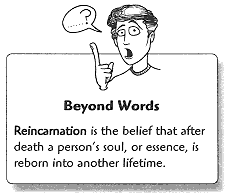|
|
|
|
|
|
|
This universal law of cause and effect is based on the idea that all of your actions, and perhaps even your thoughts, will come back to you, sooner or later. For example, if you live a loving and kind life, those experiences will come back to you. But if you are cruel or vindictive, eventually you yourself will become victim to cruelty or revenge. Karma comes back to you both in this life and the next and probably the next. For example, if you punch someone in the jaw, your karma may well return to you then and there. And if you tend to lose your temper a lot, that kind of karma can carry over into other lifetimes. |
|
|
|
|
|
|
|
|
For most people brought up in the Western, Judeo-Christian world, karma sounds like a system of justice and retribution. But here, once again, we run into that question of free will. Karma is not determined and judged by an external third party (God), who then punishes you. Instead, karma is affected by free will: You can choose how you want to live and act, and thereby what type of karma you create, from here on out. But what gets tricky is this question: Where does your existing karma, what you're living with right now, come from? To clarify, let's say you're a good person, but bad things happen to youdespite your ever-increasing efforts to be kind and helpful. What's going wrong? The ''bad" karma that you accumulated in previous lives may be still catching up to you. |
|
|
|
|
|
|
|
|
The Ancient Tradition of Reincarnation |
|
|
|
|
|
|
|
|
The concept of karma makes more sense when you see it against the backdrop of reincarnation. This belief holds that each person's soul has passed through many bodies (or incarnations) and lifetimes. Each lifetime offers an opportunity for spiritual growth, greater consciousness, and creating better karma. |
|
|
|
|
|
|
|
|
 |
|
|
|
|
|
|
|
|
The idea of karma belongs to Hinduism, the world's oldest religion that dates back to 4000 B.C. (Interestingly, Hinduism's first written acknowledgement of reincarnation dates from about the same time that Pythagorus in Greece wrote about it: in the sixth century B.C., which means the concept is more universal than you might think.) Buddhism, an offshoot of Hinduism, refers to reincarnation as a "Wheel of Becoming" or a "Wheel of Birth and Death." This circular image suggests that the actions, or karma, you set in motion don't necessarily return to you in the lifetime that follows your current one. Karma need not bounce back so abruptly; the karma of a single deed may come back to you over the course of various lifetimes. |
|
|
|
|
|